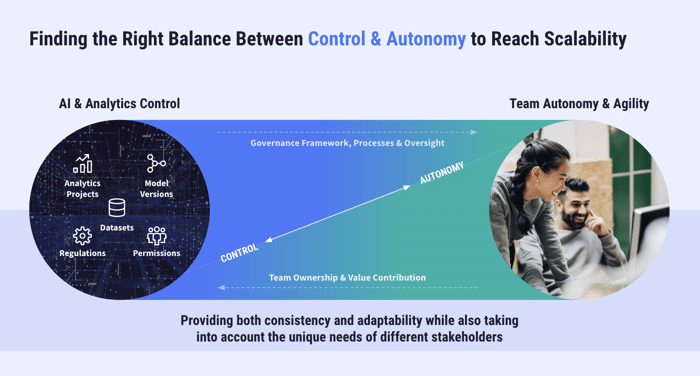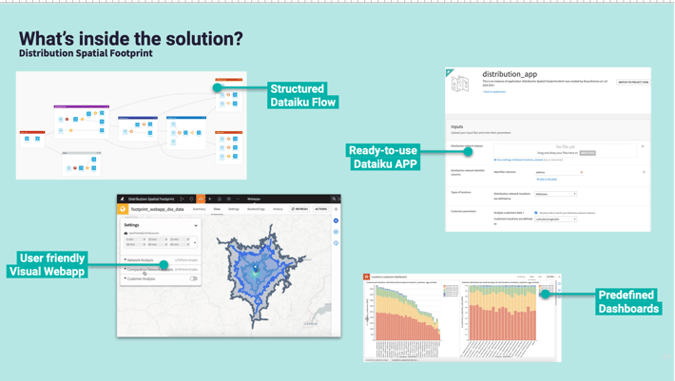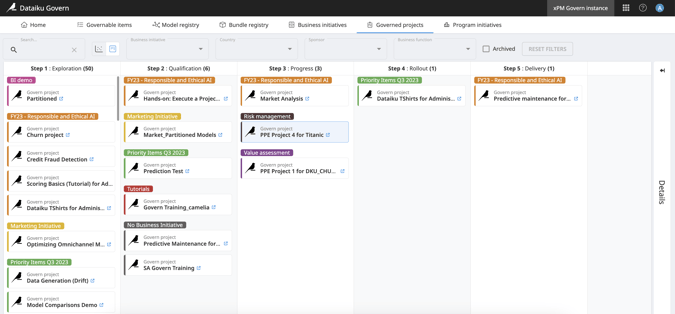You may be reflecting on the heart of your data democratization strategy. Your data isn't of good quality, and you doubt its relevance. In the meantime, you're under constant pressure from a growing number of business stakeholders, demanding access to data to unlock ever greater value. And you're wondering what initiatives to put in place to democratize it. Welcome to the dilemma of democratizing analytics and AI.
In this blog post, we present key advice to guide IT players on their journey toward becoming business catalysts with data and AI. We will explore strategies for effectively empowering domain experts while maintaining governance, discuss the benefits of collaboration and knowledge sharing, and highlight the importance of operationalization.
Advice #1: Stop Obsessing Over Data Control & Escape Data Prisons for Enhanced Team Impact
For years, companies have focused on centralizing and ensuring the integrity of their data, considering it the ultimate goal in data management. The quest for reliable, controlled datasets that meet top-notch quality requirements like validity and uniqueness has been a top priority. However, while structuring data and ensuring its reliability are commendable objectives, this approach has limitations: The volume and variety of data continues to grow, accompanied by an increasing number of data workers who require immediate access to information. This makes the traditional centralized approach impractical.
If organizations become too fixated on maintaining data integrity, they risk creating isolated data cells. Paradoxically, their efforts to prioritize data integrity may hinder the effective utilization of data, negating the value they sought to achieve.

Advice #2: Prioritize Data Sharing and Unlock Data for the Business
It is crucial to remember the wisdom of Thomas Edison's adage: "The value of an idea lies in the use of it." It also applies to data. While data integrity remains essential, it should not overshadow the need for data utilization.
Rather than solely focusing on centralization, companies should prioritize enabling data access and utilization across various departments and roles. By embracing a more decentralized approach that emphasizes data sharing and collaboration, organizations move closer to the business and can maximize the value derived from their data. What's more, it's an opportunity to benefit from the unique expertise of business experts to enrich data and make it even better.Empowering data workers with access to diverse data sources and fostering a culture of data utilization can lead to valuable insights, informed decision-making, and innovative solutions.
Organized data sharing presents significant value for businesses that face challenges such as discovering, finding, and sharing relevant data. An organized data sharing place at the heart of an analytics platform serves as the solution. It facilitates efficient sharing while maintaining control, providing a unified platform for discovery, access, and collaboration. Benefits include centralizing data and analytics, making trusted data actionable for informed decision-making, and enabling effortless sharing and consumption of data products.
-2.png?width=675&height=448&name=image%20(3)-2.png)
Figure 1: Centralized data sharing within the Dataiku platform
Advice #3: Start Building Business Value With Data Products
The more you democratize your data & analytics, the more you will need to fine-tune your approach to the needs of domain experts.
Data products will then come into play: From reliable datasets to apps, predictive models, and analytical dashboards, data products are set to multiply and meet the needs of as many people as possible, without requiring advanced knowledge or expertise in data and AI.
Let's take the example of a retail channel manager. This person wants to do more than just analyze store sales data. They also want to examine the positioning and location of stores to optimize their retail distribution strategy. To make things easier for their teams who may not be as data-savvy, they want to create specific apps that can provide these insights. This way, everyone can benefit from advanced distribution network analysis and make the most out of the data available while controlling access.
Dataiku distribution spatial footprint offers a plug-and-play solution that allows retail analytics teams to understand the spatial footprint of their distribution network using a Dataiku-powered webapp. With easy tailoring of the project through a Dataiku application and the capacity to adjust the data flow to their needs, the distribution spatial footprint enables retail companies to reinforce their distribution strategies.

Dataiku distribution spatial footprint data products
Advice 4: Build Trust in Data Products and Delegate Ownership to Domain Experts
Unlike projects with a defined start and end, data products are cyclic. As such, "data product," encompasses various elements such as ownership, release, maintenance, and continuous improvement principles. Working on data products on the same platform as data itself already means maintaining the same principles and rules of transparency, thus reinforcing trust. It also reduces the risk of duplicating work or repeating processes in separate locations. This not only saves time and resources but also minimizes the potential for errors or inconsistencies that may arise from managing data and data products in multiple disconnected systems.
Furthermore, governance policies would apply the same way. Having not only a centralized view of data product governance but also the ability to instantiate validation mechanisms throughout all stages of data product deployment is crucial not only to the global trust in data products but also their compliance with the company's overall strategy.

The role of domain experts in this context is paramount: They have been delegated data product ownership and therefore can steer the solution's relevance in the field. In this context, IT will also play a key role as a partner, not only orchestrating the distribution of data products but also ensuring that they adhere to security, transparency, and compliance requirements.
Figure 2: Dataiku Govern enables domain experts & IT to centralize and supervise all data products in the enterprise.
Bringing It All Together
In the ever-evolving landscape of data and AI, organizations realize the immense value of empowering domain experts to drive business innovation. To build resilience on a decentralized approach, IT plays a key role. Striking a balance between data integrity and utilization by business units is the key to unlocking the true potential of data and driving business success with domain experts in the modern data-driven era. This means building data products together with the business, in collaboration with IT, to make the sharing of data value the key to your company's success.




